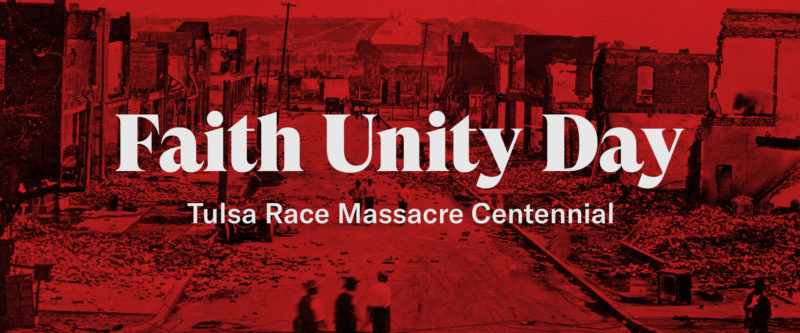Loading Content...
Share a Link to this Message
The link has been copied to your clipboard; paste it anywhere you would like to share it.
CloseMatt Nelson - May 30, 2021
Faith Unity Day - Tulsa Race Massacre Centennial

UNITY FAITH DAY Tulsa Race Massacre Centennial 5.30.21 Destroyed: • 12 churches •5 hotels •31 restaurants • 4 drug stores •8 doctor’s offices • 24 grocery stores •1 public library • Hundreds-Thousands of homes burned • As many as 300 people dead PATHWAY FOR RACIAL JUSTICE AND RECONCILIATION: 1) GOSPEL – Developing a wholistic gospel that is not limited to personal justification but moves into repentance, wholeness, love for our brothers and sisters, and freedom for the oppressed and marginalized. “Race is a gospel issue.” “Aren’t we past this issue?” “What do you mean, gospel issue? Isn’t this a social issue?” “What can the church even do about it?” “Talking about it seems to divide the church so maybe we should just focus on other things.” “Why can’t we just leave politics out of the church?” D. A. Carson Certainly the majority of Christians in America today would happily state that good race relations are a gospel issue. They might point out that God’s saving purpose is to draw to himself, through the cross, men and women from every tongue and tribe and people and nation; that the church is one new humanity, made up of Jew and Gentile; that Paul tells Philemon to treat his slave Onesimus as his brother, as the apostle himself; that this trajectory starts at creation, with all men and women being made in the image of God, and finds its anticipation in the promise to Abraham that in his seed all the nations of the earth will be blessed. Moreover, the salvation secured by Christ in the gospel is more comprehensive than justification alone: it brings repentance, wholeness, love for brothers and sisters in the Christian community. But the sad fact remains that not all Christians have always viewed race relations within the church as a gospel issue. Through the work of the gospel, God is reconciling all of humanity back to Him and each other. Ephesians 2:11-22 11 Therefore, remember that formerly you who are Gentiles by birth and called “uncircumcised” by those who call themselves “the circumcision” (which is done in the body by human hands)—12 remember that at that time you were separate from Christ, excluded from citizenship in Israel and foreigners to the covenants of the promise, without hope and without God in the world. 13 But now in Christ Jesus you who once were far away have been brought near by the blood of Christ. 14 For he himself is our peace, who has made the two groups one and has destroyed the barrier, the dividing wall of hostility, 15 by setting aside in his flesh the law with its commands and regulations. His purpose was to create in himself one new humanity out of the two, thus making peace, 16 and in one body to reconcile both of them to God through the cross, by which he put to death their hostility. 17 He came and preached peace to you who were far away and peace to those who were near. 18 For through him we both have access to the Father by one Spirit. 19 Consequently, you are no longer foreigners and strangers, but fellow citizens with God’s people and also members of his household, 20 built on the foundation of the apostles and prophets, with Christ Jesus himself as the chief cornerstone. 21 In him the whole building is joined together and rises to become a holy temple in the Lord. 22 And in him you too are being built together to become a dwelling in which God lives by his Spirit. 2) REPENTANCE – A willingness to examine our own hearts to identify the racism, discrimination, and prejudices that exist in all of us and allow it to move us towards honesty, confession, change, and action. 3) LISTEN – In humility, we become slow to speak and quick to listen so that we can learn, educate ourselves, and be properly informed. During this time, we seek out the right voices, build bridges/relationships with people different than us, and reform our false beliefs and misunderstandings. 4) LOVE • Listen to someone’s story • Identify and tear down systematic racism and inequalities • Seek justice and take a stand when needed • Practice hospitality, bridge-building, and peacemaking • Look for opportunities to bring social/political reform
